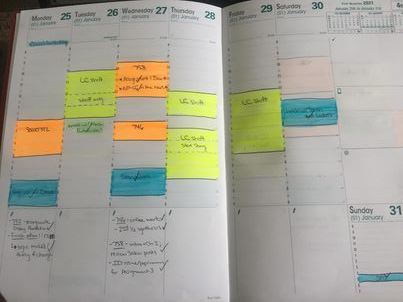Getting Through an Asynchronous Workweek
By Lea, a Graduate Learning Coach
Pandemic conditions and fully remote class loads have left many of us students with a mix of synchronous and asynchronous classes, including me. Navigating asynchronous work can be difficult, because it often lacks the enforced structure of a live lecture format and requires me to be self-reliant not only in learning the material, but also in managing my own class schedule. After one and a half semesters of virtual instruction, I’ve developed some strategies that help keep me focused and on track with my asynchronous work.
Organization
Before the pandemic, I wasn’t as strict of a planner as I am now, but asynchronous classes require me to create my own structure in order to keep up with the work. Now, my syllabi are my best friends. Spending time thoroughly reading the syllabus and transferring its information to a planner at the beginning of the semester helps me establish goals for each week of material.
I love putting due dates, readings, and other assignments in my physical planner, as well as having class times and work shifts in my digital Outlook calendar, with appropriate Zoom links included.
Additionally, I strive to create structure in my day that mirrors synchronous classes by also assigning recurring “class times” for asynchronous work. I prefer to do this work during the lecture times listed in ConnectCarolina. This helps me stay on track with my asynchronous work so that it does not pile up and overwhelm me.
Time Management
My planner not only helps to keep me organized, it plays a crucial role in my time management! Watching a series of videos, reading textbooks or articles, doing warmups and practice problems – a lot of time and effort goes into the “class work” portion of asynchronous classes. Establishing a regularly recurring time to do that work adds the extra structure I need to succeed in a self-paced environment.

Another strategy that works for me is setting self-imposed deadlines. Without strict deadlines, I tend to procrastinate or get behind on the class work portion of asynchronous classes, in particular. I use a daily task list to set miniature deadlines for assignments, which helps with breaking them down into smaller pieces. I think of my planner as my calendar and my task list as my to-do list. This way I have a bird’s-eye view of my week as well as a more-detailed daily set of goals. Figuring out what material should be covered each week, along with which tasks are required (lecture watching, reading, note-taking, studying, etc.) helps me break large assignments down into smaller, more manageable pieces. Creating my own deadlines, in concert with my weekly plan, motivates me to get things done in a timely manner and makes time-intensive tasks more manageable.
Work-Life Balance
Most importantly, asynchronous classes and virtual learning as a whole have taught me to be kind to myself. This pandemic is not going to disappear quickly, and many of these new norms are likely here to stay for the foreseeable future. Virtual learning, combined with intense personal and ambient stress, is not an ideal situation for me–or anyone! So, it’s okay if I don’t quite accomplish what I wanted to – or anything – today. It’s okay if I’m not learning as well as I would in an in-person learning environment. It’s okay to drop a class or take a P/F if I want or need to do so. And most importantly, it’s okay to take time and space to reflect, process, and restore my mind and spirit.

Remembering that I am a human first, rather than just a student, helps me establish reasonable expectations for myself as I continue my academic journey. I look forward to being able to walk past the Old Well, see colleagues and friends in person, and sit outside surrounded by other students under a Carolina blue sky. However, until that time comes, I will continue to seek balance and joy as both a student and a person.
This blog showcases the perspectives of UNC Chapel Hill community members learning and writing online. If you want to talk to a Writing and Learning Center coach about implementing strategies described in the blog, make an appointment with a writing coach or an academic coach today. Have an idea for a blog post about how you are learning and writing remotely? Contact us here.

